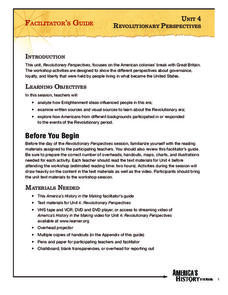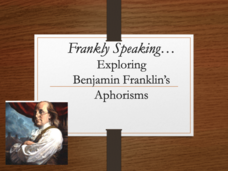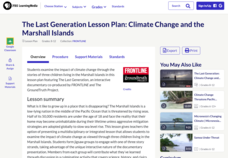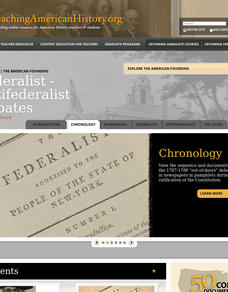Council for Economic Education
Out of Africa: Why Early Humans Settled around the World
Why would someone want to leave home? The age-old question is at the center of a thought-provoking activity. Scholars consider why humans move around the world both during pre-historical times and today using a PowerPoint, reading on...
Council for Economic Education
What Makes an Entrepreneur?
What do the founders of Wendy's and Virgin Airlines have in common? They are both entrepreneurs! Key definitions and case studies help learners brainstorm their own definitions of what it takes to succeed in business. A series of...
US House of Representatives
A Picture Is Worth a Thousand Words
As part of a study of women in Congress, groups analyze historical photographs associated with women's history and with women senators and representatives.
US House of Representatives
Objects in Time
What is the role artifacts play in the study of past events and people? As part of an examination of the careers and contributions of women in Congress from 1917 to 2006, groups examine artifacts that symbolize each woman.
US House of Representatives
Traditionalist, Feminist, and the New Face of Women in Congress, 1955–1976
As part of a study of women in Congress, class members read the contextual essay, "A Changing of the Guard; Traditionalist, Feminist, and the New Face of Women in Congress, 1955–1976." Groups then research a woman serving during this...
US House of Representatives
Congresswomen in an Age of National Crises, 1935–1954
Class members investigate congresswomen and the role these senators and representatives played in congress during the period from 1935–1954.
News For Kids
News For Kids.net
Media lovers read articles on a variety of current events with a website made especially for kids. The website is easy to navigate and includes sections about everything from science to sports.
Annenberg Foundation
Antebellum Reform
Scholars investigate the Antebellum period in the United States in an engaging lesson. Groups analyze technological, religious, economic, and social changes occurring during the time period prior to the Civil War. Using their new...
Annenberg Foundation
Revolutionary Perspectives
Life, liberty, and the pursuit of happiness. Learners go to the heart of the causes of the American Revolution. Examining political cartoons, Enlightenment documents, and firsthand accounts, they present their ideas and reflective...
Annenberg Foundation
Colonial Designs
The adventures of the New World came at a cost for Native Americans. Scholars investigate the economic side of settling the European colonies. Using video clips, statistical evidence, and primary sources, they create hypotheses and...
PBS
Using Primary Sources: Wide Open Town
A picture speaks a thousand words, no matter how old! Scholars use political cartoons from the era of Prohibition and the Temperance Movement to analyze what, a primary document (in this case, a bootlegger's notebook) is telling them...
Council for Economic Education
Christopher Columbus, Entrepreneur? Queen Isabella, Venture Capitalist?
What did it take to embark on a journey to unknown lands? Perhaps ambition, but also money! Christopher Columbus had to approach more than one European monarch for financing before he could sail the ocean blue. A read-along play and...
Council for Economic Education
Why Didn't China Discover the New World?
Who was Zheng He and why haven't we heard of him? Scholars consider the question as they compare his vast expeditionary force to that of Christopher Columbus. Young historians then ponder the intersection of science, economics, and...
Council for Economic Education
Business in the Middle Ages: Working in a Guild
Long before modern labor unions, guilds worked to ensure that workers had a fair wage. But, in medieval Europe, they also cooperated with the government. Using a simulation and primary source analysis, young scholars become hatters in...
Council for Economic Education
Wages and the Black Death
While the Black Death wiped out a third of Europe's population during the Middle Ages, its destruction paved the way for better wages for workers and even an early form of modern capitalism. The relationship between the cataclysmic event...
Council for Economic Education
Athens and Sparta-Imagine the Possibilities
Both Athens and Sparta made choices to survive in ancient Greece. Those choices were, in essence, economic ones about how to direct resources. A Venn diagram activity and reading ask class members to examine the connection between...
Council for Economic Education
Entrepreneurs in Mesopotamia
While ancient Mesopotamia didn't have the TV show "Shark Tank," it was a time of entrepreneurship as workers began to specialize. Both individual workers and the societal structure encouraged individuals to consider how they could...
Council for Economic Education
Great Civilizations Develop around Rivers
If you lived in prehistoric times, what kinds of choices could your family make to increase their chance of survival? By making similar decisions in a simulation game, participants discover how specialization creates both opportunity and...
Chandler Unified School District
Frankly Speaking: Exploring Benjamin Franklin's Aphorisms
Benjamin Franklin famously had an aphorism for every situation—most of which we still use in modern vernacular. Introduce class members to Franklin's Poor Richard's Almanack with a presentation that details the characteristics of aphorisms.
PBS
The Last Generation: Climate Change and the Marshall Islands
Are some families down to their last generation? The final segment of a two-part climate change series investigates the vanishing Marshall Islands. Scholars divide into research teams to analyze three different individuals whose lives...
PBS
The Last Generation
How does climate impact the town, city, or area where people live? Scholars research the concept of climate change as it pertains to the Marshall Islands. The opening lesson of a two-part series uses interactive online resources and...
Ashbrook Center at Ashland University
Ratification of the Constitution
How difficult was it to get everyone to agree on the contents of the Constitution? Historians analyze the task of the Founding Fathers in creating the United States Constitution. They research a directory of video clips, primary sources,...
Ashbrook Center at Ashland University
Bill of Rights
Do citizens need protection from the federal government? Scholars investigate why the framers of the Constitution created the first 10 amendments and what these amendments mean to citizens of the United States more than 200 years later....
Ashbrook Center at Ashland University
Federalist - Antifederalist Debates
Who should have the power—individual states or the federal government? Scholars research the arguments of the Federalists and Anti-Federalists during the formation of the United States Constitution. Online resources, including a vast...

























